Business Law: Contract, Negligent Misstatement, and Company Law
VerifiedAdded on 2022/12/19
|10
|3260
|79
AI Summary
This coursework discusses contract law, negligent misstatement, and company law. It covers case scenarios, contractual obligations, and the concept of separate legal entity in company law.
Contribute Materials
Your contribution can guide someone’s learning journey. Share your
documents today.
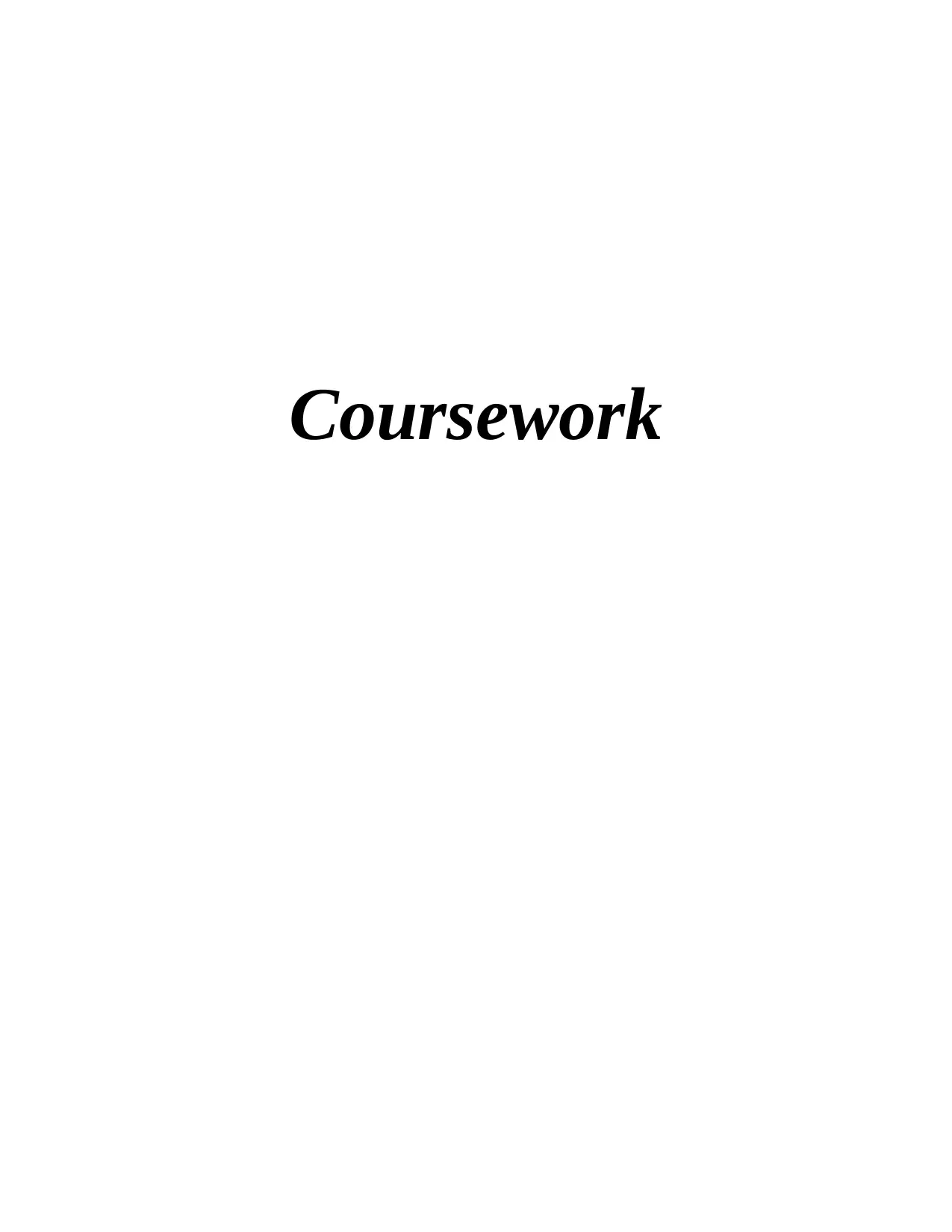
Coursework
Secure Best Marks with AI Grader
Need help grading? Try our AI Grader for instant feedback on your assignments.
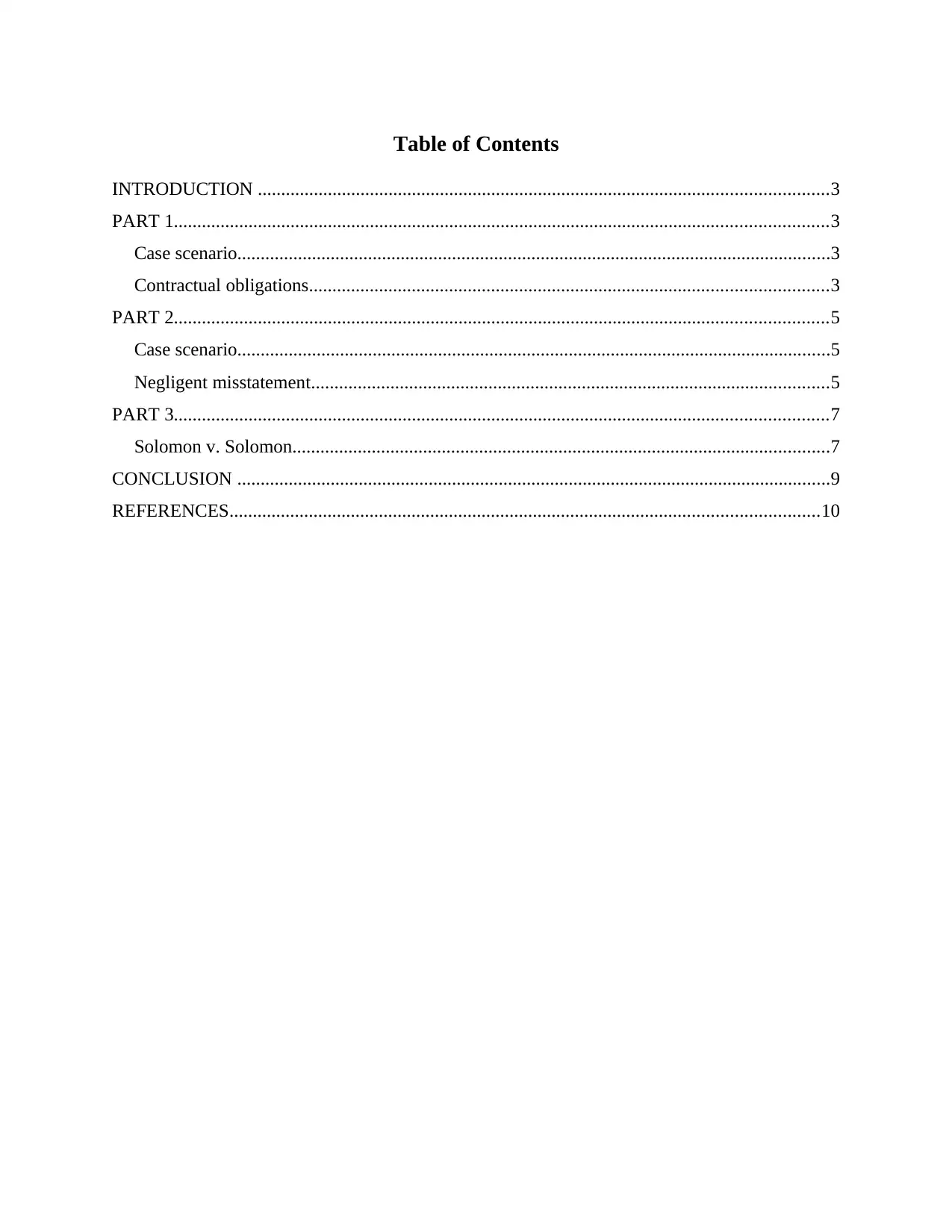
Table of Contents
INTRODUCTION ..........................................................................................................................3
PART 1............................................................................................................................................3
Case scenario...............................................................................................................................3
Contractual obligations...............................................................................................................3
PART 2............................................................................................................................................5
Case scenario...............................................................................................................................5
Negligent misstatement...............................................................................................................5
PART 3............................................................................................................................................7
Solomon v. Solomon...................................................................................................................7
CONCLUSION ...............................................................................................................................9
REFERENCES..............................................................................................................................10
INTRODUCTION ..........................................................................................................................3
PART 1............................................................................................................................................3
Case scenario...............................................................................................................................3
Contractual obligations...............................................................................................................3
PART 2............................................................................................................................................5
Case scenario...............................................................................................................................5
Negligent misstatement...............................................................................................................5
PART 3............................................................................................................................................7
Solomon v. Solomon...................................................................................................................7
CONCLUSION ...............................................................................................................................9
REFERENCES..............................................................................................................................10
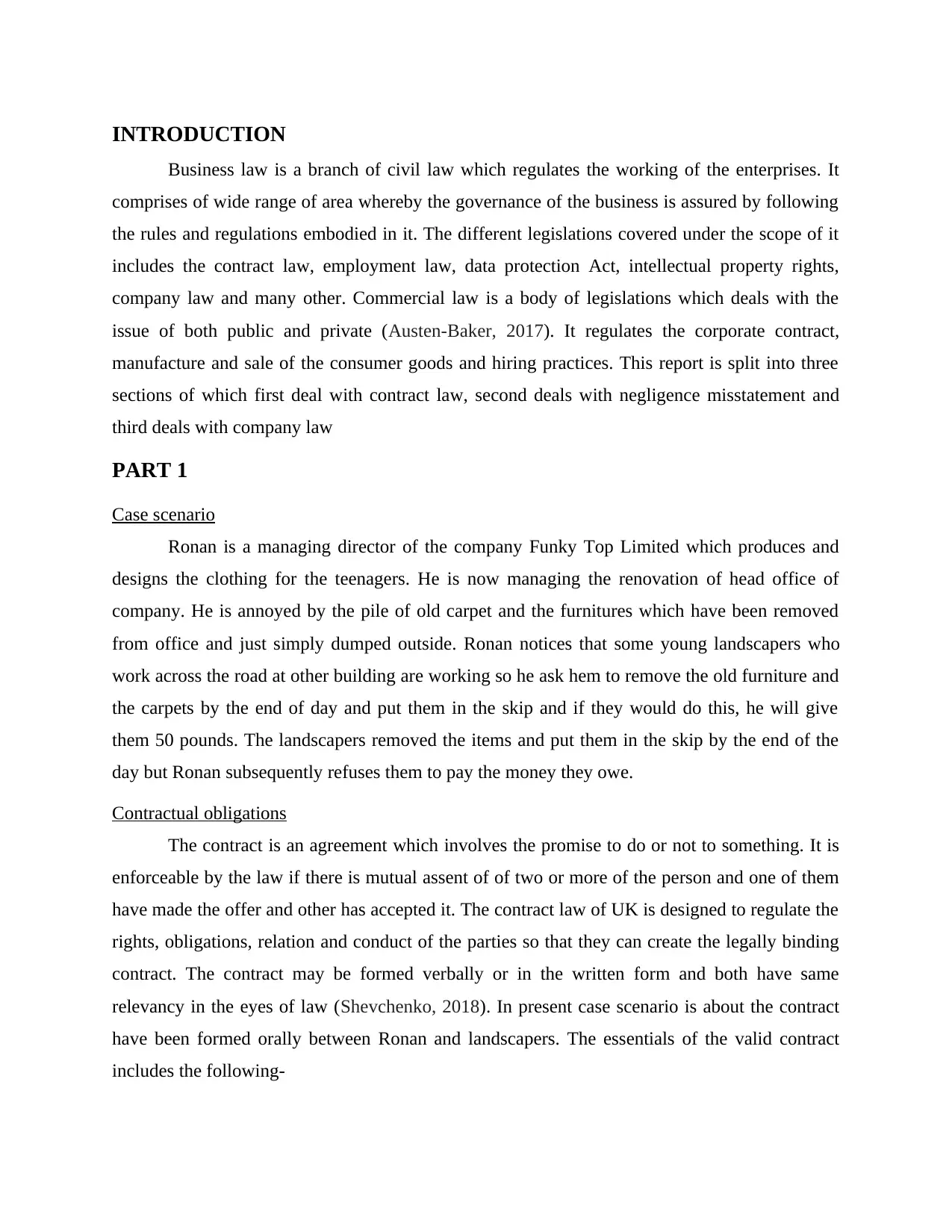
INTRODUCTION
Business law is a branch of civil law which regulates the working of the enterprises. It
comprises of wide range of area whereby the governance of the business is assured by following
the rules and regulations embodied in it. The different legislations covered under the scope of it
includes the contract law, employment law, data protection Act, intellectual property rights,
company law and many other. Commercial law is a body of legislations which deals with the
issue of both public and private (Austen-Baker, 2017). It regulates the corporate contract,
manufacture and sale of the consumer goods and hiring practices. This report is split into three
sections of which first deal with contract law, second deals with negligence misstatement and
third deals with company law
PART 1
Case scenario
Ronan is a managing director of the company Funky Top Limited which produces and
designs the clothing for the teenagers. He is now managing the renovation of head office of
company. He is annoyed by the pile of old carpet and the furnitures which have been removed
from office and just simply dumped outside. Ronan notices that some young landscapers who
work across the road at other building are working so he ask hem to remove the old furniture and
the carpets by the end of day and put them in the skip and if they would do this, he will give
them 50 pounds. The landscapers removed the items and put them in the skip by the end of the
day but Ronan subsequently refuses them to pay the money they owe.
Contractual obligations
The contract is an agreement which involves the promise to do or not to something. It is
enforceable by the law if there is mutual assent of of two or more of the person and one of them
have made the offer and other has accepted it. The contract law of UK is designed to regulate the
rights, obligations, relation and conduct of the parties so that they can create the legally binding
contract. The contract may be formed verbally or in the written form and both have same
relevancy in the eyes of law (Shevchenko, 2018). In present case scenario is about the contract
have been formed orally between Ronan and landscapers. The essentials of the valid contract
includes the following-
Business law is a branch of civil law which regulates the working of the enterprises. It
comprises of wide range of area whereby the governance of the business is assured by following
the rules and regulations embodied in it. The different legislations covered under the scope of it
includes the contract law, employment law, data protection Act, intellectual property rights,
company law and many other. Commercial law is a body of legislations which deals with the
issue of both public and private (Austen-Baker, 2017). It regulates the corporate contract,
manufacture and sale of the consumer goods and hiring practices. This report is split into three
sections of which first deal with contract law, second deals with negligence misstatement and
third deals with company law
PART 1
Case scenario
Ronan is a managing director of the company Funky Top Limited which produces and
designs the clothing for the teenagers. He is now managing the renovation of head office of
company. He is annoyed by the pile of old carpet and the furnitures which have been removed
from office and just simply dumped outside. Ronan notices that some young landscapers who
work across the road at other building are working so he ask hem to remove the old furniture and
the carpets by the end of day and put them in the skip and if they would do this, he will give
them 50 pounds. The landscapers removed the items and put them in the skip by the end of the
day but Ronan subsequently refuses them to pay the money they owe.
Contractual obligations
The contract is an agreement which involves the promise to do or not to something. It is
enforceable by the law if there is mutual assent of of two or more of the person and one of them
have made the offer and other has accepted it. The contract law of UK is designed to regulate the
rights, obligations, relation and conduct of the parties so that they can create the legally binding
contract. The contract may be formed verbally or in the written form and both have same
relevancy in the eyes of law (Shevchenko, 2018). In present case scenario is about the contract
have been formed orally between Ronan and landscapers. The essentials of the valid contract
includes the following-
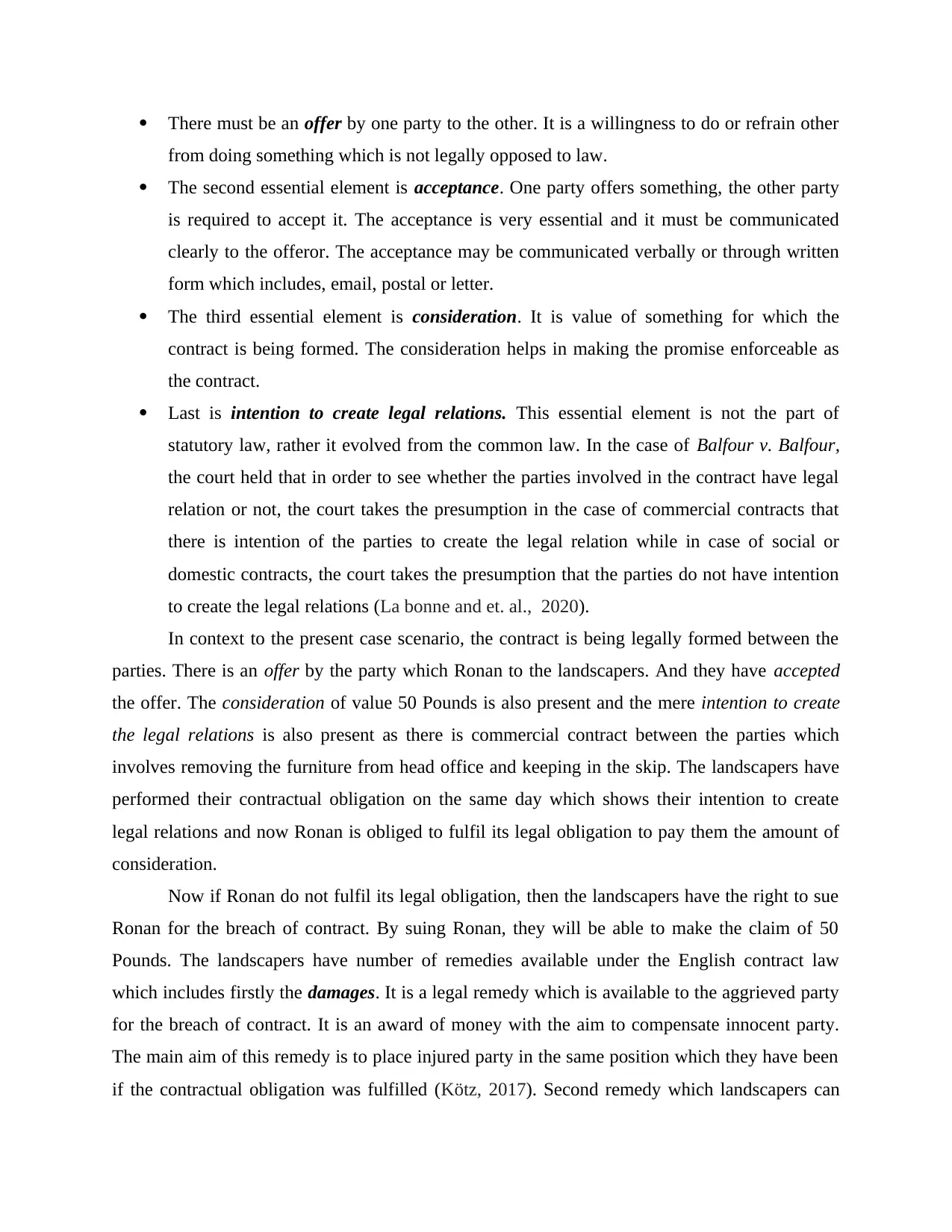
There must be an offer by one party to the other. It is a willingness to do or refrain other
from doing something which is not legally opposed to law.
The second essential element is acceptance. One party offers something, the other party
is required to accept it. The acceptance is very essential and it must be communicated
clearly to the offeror. The acceptance may be communicated verbally or through written
form which includes, email, postal or letter.
The third essential element is consideration. It is value of something for which the
contract is being formed. The consideration helps in making the promise enforceable as
the contract.
Last is intention to create legal relations. This essential element is not the part of
statutory law, rather it evolved from the common law. In the case of Balfour v. Balfour,
the court held that in order to see whether the parties involved in the contract have legal
relation or not, the court takes the presumption in the case of commercial contracts that
there is intention of the parties to create the legal relation while in case of social or
domestic contracts, the court takes the presumption that the parties do not have intention
to create the legal relations (La bonne and et. al., 2020).
In context to the present case scenario, the contract is being legally formed between the
parties. There is an offer by the party which Ronan to the landscapers. And they have accepted
the offer. The consideration of value 50 Pounds is also present and the mere intention to create
the legal relations is also present as there is commercial contract between the parties which
involves removing the furniture from head office and keeping in the skip. The landscapers have
performed their contractual obligation on the same day which shows their intention to create
legal relations and now Ronan is obliged to fulfil its legal obligation to pay them the amount of
consideration.
Now if Ronan do not fulfil its legal obligation, then the landscapers have the right to sue
Ronan for the breach of contract. By suing Ronan, they will be able to make the claim of 50
Pounds. The landscapers have number of remedies available under the English contract law
which includes firstly the damages. It is a legal remedy which is available to the aggrieved party
for the breach of contract. It is an award of money with the aim to compensate innocent party.
The main aim of this remedy is to place injured party in the same position which they have been
if the contractual obligation was fulfilled (Kötz, 2017). Second remedy which landscapers can
from doing something which is not legally opposed to law.
The second essential element is acceptance. One party offers something, the other party
is required to accept it. The acceptance is very essential and it must be communicated
clearly to the offeror. The acceptance may be communicated verbally or through written
form which includes, email, postal or letter.
The third essential element is consideration. It is value of something for which the
contract is being formed. The consideration helps in making the promise enforceable as
the contract.
Last is intention to create legal relations. This essential element is not the part of
statutory law, rather it evolved from the common law. In the case of Balfour v. Balfour,
the court held that in order to see whether the parties involved in the contract have legal
relation or not, the court takes the presumption in the case of commercial contracts that
there is intention of the parties to create the legal relation while in case of social or
domestic contracts, the court takes the presumption that the parties do not have intention
to create the legal relations (La bonne and et. al., 2020).
In context to the present case scenario, the contract is being legally formed between the
parties. There is an offer by the party which Ronan to the landscapers. And they have accepted
the offer. The consideration of value 50 Pounds is also present and the mere intention to create
the legal relations is also present as there is commercial contract between the parties which
involves removing the furniture from head office and keeping in the skip. The landscapers have
performed their contractual obligation on the same day which shows their intention to create
legal relations and now Ronan is obliged to fulfil its legal obligation to pay them the amount of
consideration.
Now if Ronan do not fulfil its legal obligation, then the landscapers have the right to sue
Ronan for the breach of contract. By suing Ronan, they will be able to make the claim of 50
Pounds. The landscapers have number of remedies available under the English contract law
which includes firstly the damages. It is a legal remedy which is available to the aggrieved party
for the breach of contract. It is an award of money with the aim to compensate innocent party.
The main aim of this remedy is to place injured party in the same position which they have been
if the contractual obligation was fulfilled (Kötz, 2017). Second remedy which landscapers can
Secure Best Marks with AI Grader
Need help grading? Try our AI Grader for instant feedback on your assignments.
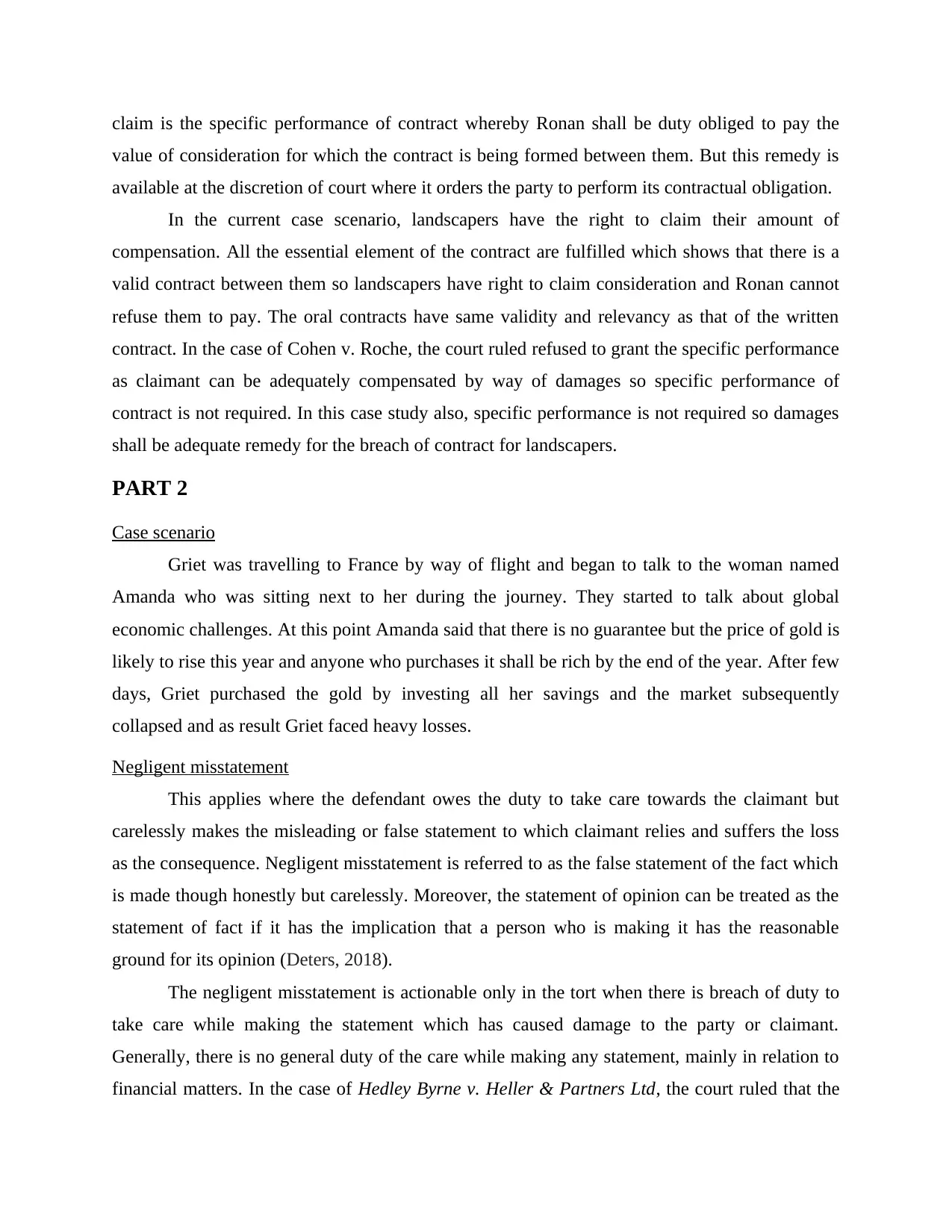
claim is the specific performance of contract whereby Ronan shall be duty obliged to pay the
value of consideration for which the contract is being formed between them. But this remedy is
available at the discretion of court where it orders the party to perform its contractual obligation.
In the current case scenario, landscapers have the right to claim their amount of
compensation. All the essential element of the contract are fulfilled which shows that there is a
valid contract between them so landscapers have right to claim consideration and Ronan cannot
refuse them to pay. The oral contracts have same validity and relevancy as that of the written
contract. In the case of Cohen v. Roche, the court ruled refused to grant the specific performance
as claimant can be adequately compensated by way of damages so specific performance of
contract is not required. In this case study also, specific performance is not required so damages
shall be adequate remedy for the breach of contract for landscapers.
PART 2
Case scenario
Griet was travelling to France by way of flight and began to talk to the woman named
Amanda who was sitting next to her during the journey. They started to talk about global
economic challenges. At this point Amanda said that there is no guarantee but the price of gold is
likely to rise this year and anyone who purchases it shall be rich by the end of the year. After few
days, Griet purchased the gold by investing all her savings and the market subsequently
collapsed and as result Griet faced heavy losses.
Negligent misstatement
This applies where the defendant owes the duty to take care towards the claimant but
carelessly makes the misleading or false statement to which claimant relies and suffers the loss
as the consequence. Negligent misstatement is referred to as the false statement of the fact which
is made though honestly but carelessly. Moreover, the statement of opinion can be treated as the
statement of fact if it has the implication that a person who is making it has the reasonable
ground for its opinion (Deters, 2018).
The negligent misstatement is actionable only in the tort when there is breach of duty to
take care while making the statement which has caused damage to the party or claimant.
Generally, there is no general duty of the care while making any statement, mainly in relation to
financial matters. In the case of Hedley Byrne v. Heller & Partners Ltd, the court ruled that the
value of consideration for which the contract is being formed between them. But this remedy is
available at the discretion of court where it orders the party to perform its contractual obligation.
In the current case scenario, landscapers have the right to claim their amount of
compensation. All the essential element of the contract are fulfilled which shows that there is a
valid contract between them so landscapers have right to claim consideration and Ronan cannot
refuse them to pay. The oral contracts have same validity and relevancy as that of the written
contract. In the case of Cohen v. Roche, the court ruled refused to grant the specific performance
as claimant can be adequately compensated by way of damages so specific performance of
contract is not required. In this case study also, specific performance is not required so damages
shall be adequate remedy for the breach of contract for landscapers.
PART 2
Case scenario
Griet was travelling to France by way of flight and began to talk to the woman named
Amanda who was sitting next to her during the journey. They started to talk about global
economic challenges. At this point Amanda said that there is no guarantee but the price of gold is
likely to rise this year and anyone who purchases it shall be rich by the end of the year. After few
days, Griet purchased the gold by investing all her savings and the market subsequently
collapsed and as result Griet faced heavy losses.
Negligent misstatement
This applies where the defendant owes the duty to take care towards the claimant but
carelessly makes the misleading or false statement to which claimant relies and suffers the loss
as the consequence. Negligent misstatement is referred to as the false statement of the fact which
is made though honestly but carelessly. Moreover, the statement of opinion can be treated as the
statement of fact if it has the implication that a person who is making it has the reasonable
ground for its opinion (Deters, 2018).
The negligent misstatement is actionable only in the tort when there is breach of duty to
take care while making the statement which has caused damage to the party or claimant.
Generally, there is no general duty of the care while making any statement, mainly in relation to
financial matters. In the case of Hedley Byrne v. Heller & Partners Ltd, the court ruled that the
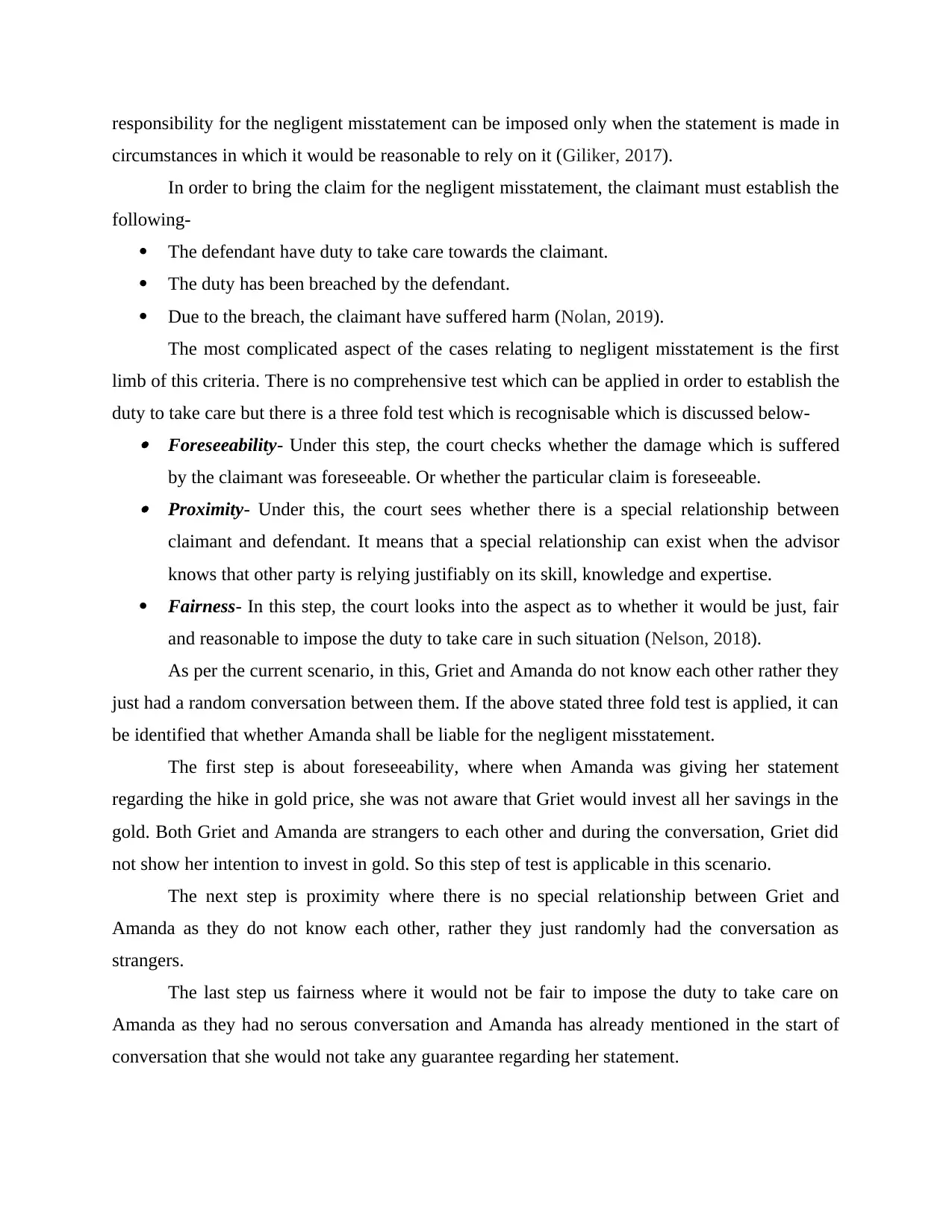
responsibility for the negligent misstatement can be imposed only when the statement is made in
circumstances in which it would be reasonable to rely on it (Giliker, 2017).
In order to bring the claim for the negligent misstatement, the claimant must establish the
following-
The defendant have duty to take care towards the claimant.
The duty has been breached by the defendant.
Due to the breach, the claimant have suffered harm (Nolan, 2019).
The most complicated aspect of the cases relating to negligent misstatement is the first
limb of this criteria. There is no comprehensive test which can be applied in order to establish the
duty to take care but there is a three fold test which is recognisable which is discussed below- Foreseeability- Under this step, the court checks whether the damage which is suffered
by the claimant was foreseeable. Or whether the particular claim is foreseeable. Proximity- Under this, the court sees whether there is a special relationship between
claimant and defendant. It means that a special relationship can exist when the advisor
knows that other party is relying justifiably on its skill, knowledge and expertise.
Fairness- In this step, the court looks into the aspect as to whether it would be just, fair
and reasonable to impose the duty to take care in such situation (Nelson, 2018).
As per the current scenario, in this, Griet and Amanda do not know each other rather they
just had a random conversation between them. If the above stated three fold test is applied, it can
be identified that whether Amanda shall be liable for the negligent misstatement.
The first step is about foreseeability, where when Amanda was giving her statement
regarding the hike in gold price, she was not aware that Griet would invest all her savings in the
gold. Both Griet and Amanda are strangers to each other and during the conversation, Griet did
not show her intention to invest in gold. So this step of test is applicable in this scenario.
The next step is proximity where there is no special relationship between Griet and
Amanda as they do not know each other, rather they just randomly had the conversation as
strangers.
The last step us fairness where it would not be fair to impose the duty to take care on
Amanda as they had no serous conversation and Amanda has already mentioned in the start of
conversation that she would not take any guarantee regarding her statement.
circumstances in which it would be reasonable to rely on it (Giliker, 2017).
In order to bring the claim for the negligent misstatement, the claimant must establish the
following-
The defendant have duty to take care towards the claimant.
The duty has been breached by the defendant.
Due to the breach, the claimant have suffered harm (Nolan, 2019).
The most complicated aspect of the cases relating to negligent misstatement is the first
limb of this criteria. There is no comprehensive test which can be applied in order to establish the
duty to take care but there is a three fold test which is recognisable which is discussed below- Foreseeability- Under this step, the court checks whether the damage which is suffered
by the claimant was foreseeable. Or whether the particular claim is foreseeable. Proximity- Under this, the court sees whether there is a special relationship between
claimant and defendant. It means that a special relationship can exist when the advisor
knows that other party is relying justifiably on its skill, knowledge and expertise.
Fairness- In this step, the court looks into the aspect as to whether it would be just, fair
and reasonable to impose the duty to take care in such situation (Nelson, 2018).
As per the current scenario, in this, Griet and Amanda do not know each other rather they
just had a random conversation between them. If the above stated three fold test is applied, it can
be identified that whether Amanda shall be liable for the negligent misstatement.
The first step is about foreseeability, where when Amanda was giving her statement
regarding the hike in gold price, she was not aware that Griet would invest all her savings in the
gold. Both Griet and Amanda are strangers to each other and during the conversation, Griet did
not show her intention to invest in gold. So this step of test is applicable in this scenario.
The next step is proximity where there is no special relationship between Griet and
Amanda as they do not know each other, rather they just randomly had the conversation as
strangers.
The last step us fairness where it would not be fair to impose the duty to take care on
Amanda as they had no serous conversation and Amanda has already mentioned in the start of
conversation that she would not take any guarantee regarding her statement.
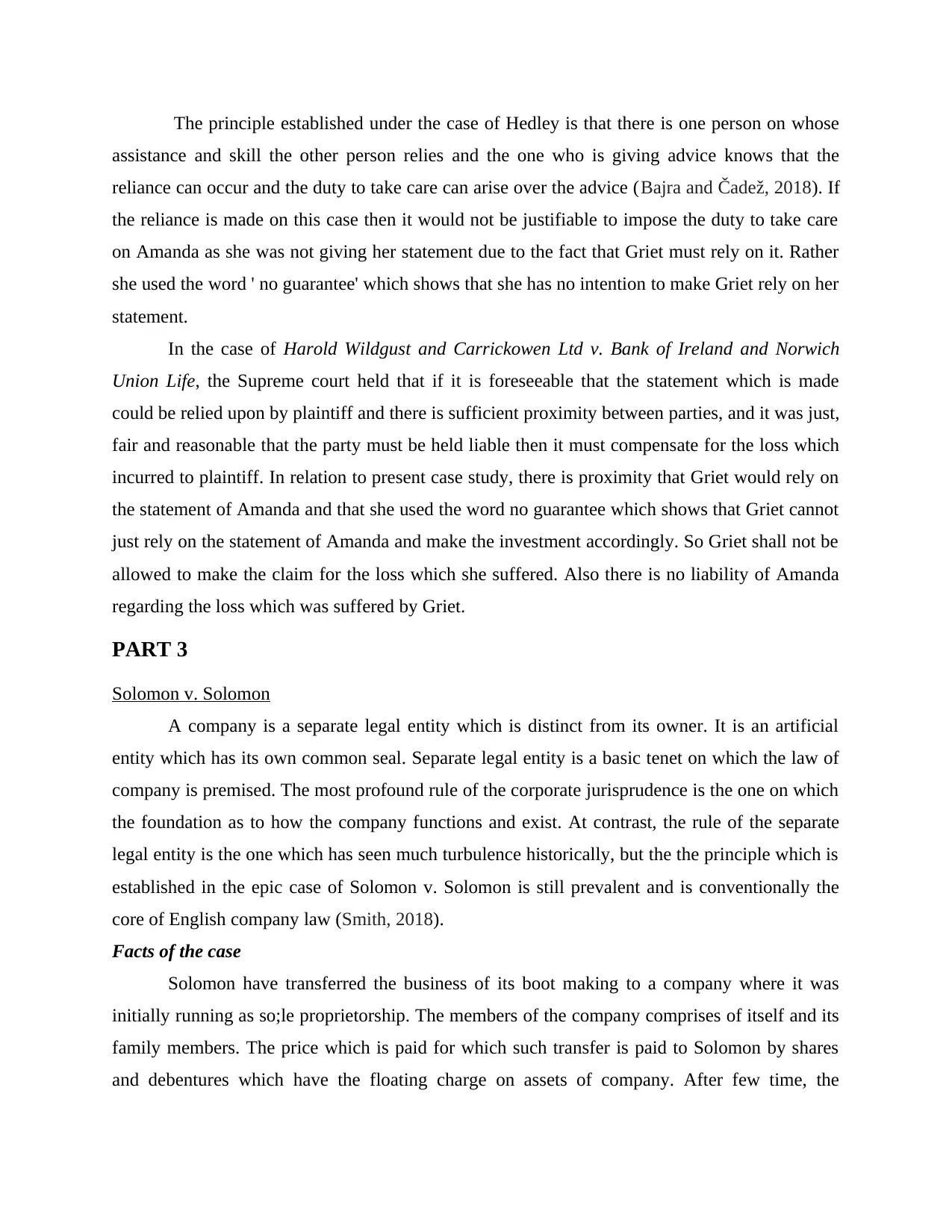
The principle established under the case of Hedley is that there is one person on whose
assistance and skill the other person relies and the one who is giving advice knows that the
reliance can occur and the duty to take care can arise over the advice (Bajra and Čadež, 2018). If
the reliance is made on this case then it would not be justifiable to impose the duty to take care
on Amanda as she was not giving her statement due to the fact that Griet must rely on it. Rather
she used the word ' no guarantee' which shows that she has no intention to make Griet rely on her
statement.
In the case of Harold Wildgust and Carrickowen Ltd v. Bank of Ireland and Norwich
Union Life, the Supreme court held that if it is foreseeable that the statement which is made
could be relied upon by plaintiff and there is sufficient proximity between parties, and it was just,
fair and reasonable that the party must be held liable then it must compensate for the loss which
incurred to plaintiff. In relation to present case study, there is proximity that Griet would rely on
the statement of Amanda and that she used the word no guarantee which shows that Griet cannot
just rely on the statement of Amanda and make the investment accordingly. So Griet shall not be
allowed to make the claim for the loss which she suffered. Also there is no liability of Amanda
regarding the loss which was suffered by Griet.
PART 3
Solomon v. Solomon
A company is a separate legal entity which is distinct from its owner. It is an artificial
entity which has its own common seal. Separate legal entity is a basic tenet on which the law of
company is premised. The most profound rule of the corporate jurisprudence is the one on which
the foundation as to how the company functions and exist. At contrast, the rule of the separate
legal entity is the one which has seen much turbulence historically, but the the principle which is
established in the epic case of Solomon v. Solomon is still prevalent and is conventionally the
core of English company law (Smith, 2018).
Facts of the case
Solomon have transferred the business of its boot making to a company where it was
initially running as so;le proprietorship. The members of the company comprises of itself and its
family members. The price which is paid for which such transfer is paid to Solomon by shares
and debentures which have the floating charge on assets of company. After few time, the
assistance and skill the other person relies and the one who is giving advice knows that the
reliance can occur and the duty to take care can arise over the advice (Bajra and Čadež, 2018). If
the reliance is made on this case then it would not be justifiable to impose the duty to take care
on Amanda as she was not giving her statement due to the fact that Griet must rely on it. Rather
she used the word ' no guarantee' which shows that she has no intention to make Griet rely on her
statement.
In the case of Harold Wildgust and Carrickowen Ltd v. Bank of Ireland and Norwich
Union Life, the Supreme court held that if it is foreseeable that the statement which is made
could be relied upon by plaintiff and there is sufficient proximity between parties, and it was just,
fair and reasonable that the party must be held liable then it must compensate for the loss which
incurred to plaintiff. In relation to present case study, there is proximity that Griet would rely on
the statement of Amanda and that she used the word no guarantee which shows that Griet cannot
just rely on the statement of Amanda and make the investment accordingly. So Griet shall not be
allowed to make the claim for the loss which she suffered. Also there is no liability of Amanda
regarding the loss which was suffered by Griet.
PART 3
Solomon v. Solomon
A company is a separate legal entity which is distinct from its owner. It is an artificial
entity which has its own common seal. Separate legal entity is a basic tenet on which the law of
company is premised. The most profound rule of the corporate jurisprudence is the one on which
the foundation as to how the company functions and exist. At contrast, the rule of the separate
legal entity is the one which has seen much turbulence historically, but the the principle which is
established in the epic case of Solomon v. Solomon is still prevalent and is conventionally the
core of English company law (Smith, 2018).
Facts of the case
Solomon have transferred the business of its boot making to a company where it was
initially running as so;le proprietorship. The members of the company comprises of itself and its
family members. The price which is paid for which such transfer is paid to Solomon by shares
and debentures which have the floating charge on assets of company. After few time, the
Paraphrase This Document
Need a fresh take? Get an instant paraphrase of this document with our AI Paraphraser
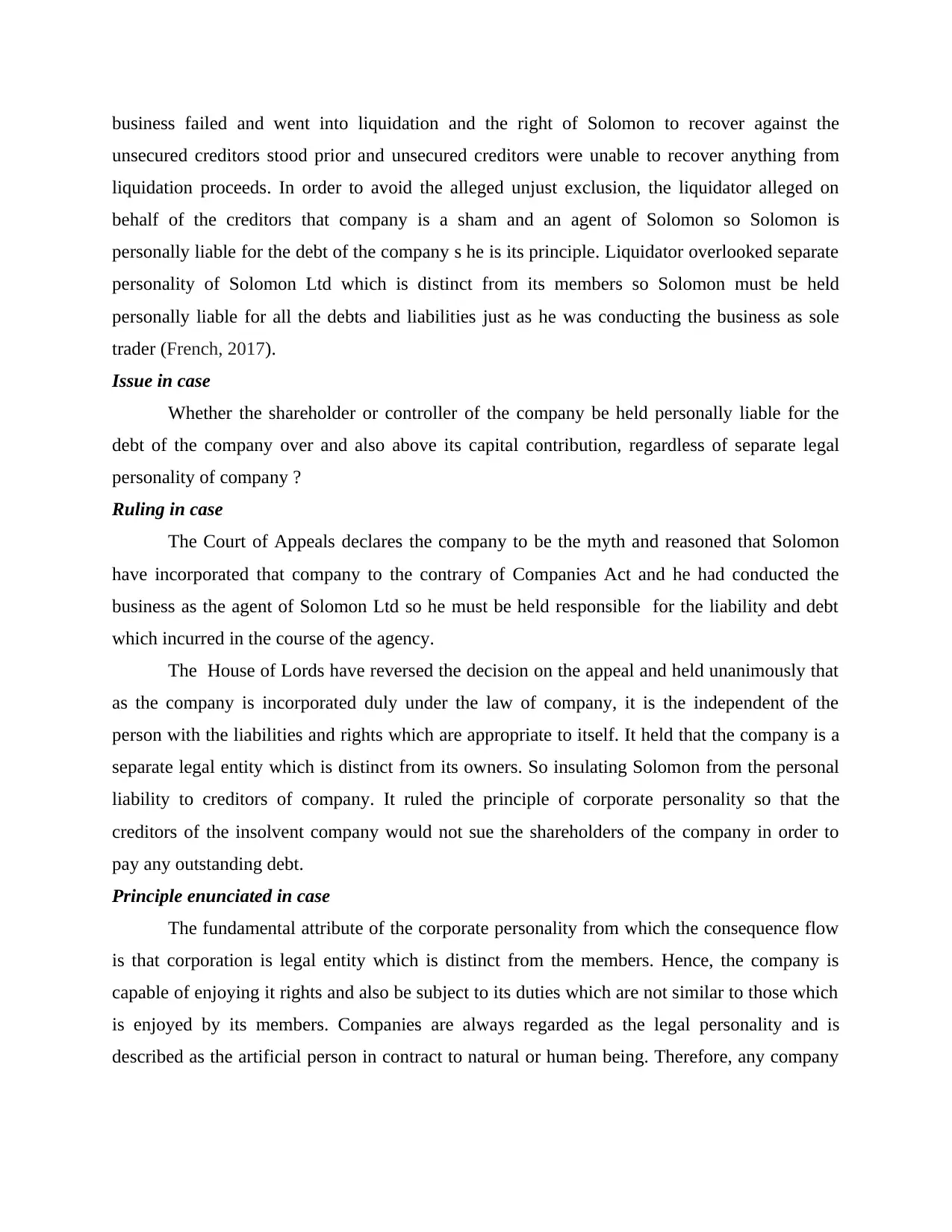
business failed and went into liquidation and the right of Solomon to recover against the
unsecured creditors stood prior and unsecured creditors were unable to recover anything from
liquidation proceeds. In order to avoid the alleged unjust exclusion, the liquidator alleged on
behalf of the creditors that company is a sham and an agent of Solomon so Solomon is
personally liable for the debt of the company s he is its principle. Liquidator overlooked separate
personality of Solomon Ltd which is distinct from its members so Solomon must be held
personally liable for all the debts and liabilities just as he was conducting the business as sole
trader (French, 2017).
Issue in case
Whether the shareholder or controller of the company be held personally liable for the
debt of the company over and also above its capital contribution, regardless of separate legal
personality of company ?
Ruling in case
The Court of Appeals declares the company to be the myth and reasoned that Solomon
have incorporated that company to the contrary of Companies Act and he had conducted the
business as the agent of Solomon Ltd so he must be held responsible for the liability and debt
which incurred in the course of the agency.
The House of Lords have reversed the decision on the appeal and held unanimously that
as the company is incorporated duly under the law of company, it is the independent of the
person with the liabilities and rights which are appropriate to itself. It held that the company is a
separate legal entity which is distinct from its owners. So insulating Solomon from the personal
liability to creditors of company. It ruled the principle of corporate personality so that the
creditors of the insolvent company would not sue the shareholders of the company in order to
pay any outstanding debt.
Principle enunciated in case
The fundamental attribute of the corporate personality from which the consequence flow
is that corporation is legal entity which is distinct from the members. Hence, the company is
capable of enjoying it rights and also be subject to its duties which are not similar to those which
is enjoyed by its members. Companies are always regarded as the legal personality and is
described as the artificial person in contract to natural or human being. Therefore, any company
unsecured creditors stood prior and unsecured creditors were unable to recover anything from
liquidation proceeds. In order to avoid the alleged unjust exclusion, the liquidator alleged on
behalf of the creditors that company is a sham and an agent of Solomon so Solomon is
personally liable for the debt of the company s he is its principle. Liquidator overlooked separate
personality of Solomon Ltd which is distinct from its members so Solomon must be held
personally liable for all the debts and liabilities just as he was conducting the business as sole
trader (French, 2017).
Issue in case
Whether the shareholder or controller of the company be held personally liable for the
debt of the company over and also above its capital contribution, regardless of separate legal
personality of company ?
Ruling in case
The Court of Appeals declares the company to be the myth and reasoned that Solomon
have incorporated that company to the contrary of Companies Act and he had conducted the
business as the agent of Solomon Ltd so he must be held responsible for the liability and debt
which incurred in the course of the agency.
The House of Lords have reversed the decision on the appeal and held unanimously that
as the company is incorporated duly under the law of company, it is the independent of the
person with the liabilities and rights which are appropriate to itself. It held that the company is a
separate legal entity which is distinct from its owners. So insulating Solomon from the personal
liability to creditors of company. It ruled the principle of corporate personality so that the
creditors of the insolvent company would not sue the shareholders of the company in order to
pay any outstanding debt.
Principle enunciated in case
The fundamental attribute of the corporate personality from which the consequence flow
is that corporation is legal entity which is distinct from the members. Hence, the company is
capable of enjoying it rights and also be subject to its duties which are not similar to those which
is enjoyed by its members. Companies are always regarded as the legal personality and is
described as the artificial person in contract to natural or human being. Therefore, any company
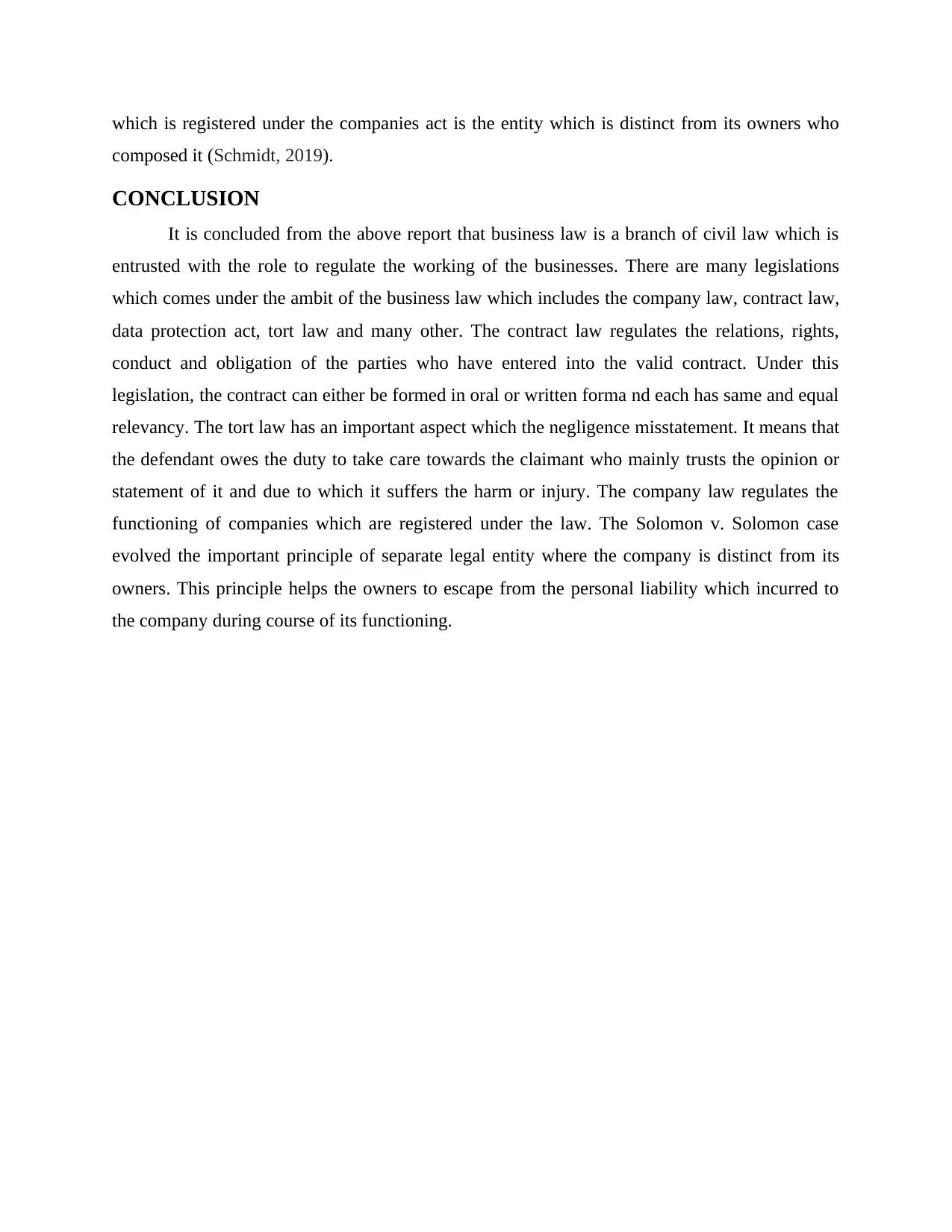
which is registered under the companies act is the entity which is distinct from its owners who
composed it (Schmidt, 2019).
CONCLUSION
It is concluded from the above report that business law is a branch of civil law which is
entrusted with the role to regulate the working of the businesses. There are many legislations
which comes under the ambit of the business law which includes the company law, contract law,
data protection act, tort law and many other. The contract law regulates the relations, rights,
conduct and obligation of the parties who have entered into the valid contract. Under this
legislation, the contract can either be formed in oral or written forma nd each has same and equal
relevancy. The tort law has an important aspect which the negligence misstatement. It means that
the defendant owes the duty to take care towards the claimant who mainly trusts the opinion or
statement of it and due to which it suffers the harm or injury. The company law regulates the
functioning of companies which are registered under the law. The Solomon v. Solomon case
evolved the important principle of separate legal entity where the company is distinct from its
owners. This principle helps the owners to escape from the personal liability which incurred to
the company during course of its functioning.
composed it (Schmidt, 2019).
CONCLUSION
It is concluded from the above report that business law is a branch of civil law which is
entrusted with the role to regulate the working of the businesses. There are many legislations
which comes under the ambit of the business law which includes the company law, contract law,
data protection act, tort law and many other. The contract law regulates the relations, rights,
conduct and obligation of the parties who have entered into the valid contract. Under this
legislation, the contract can either be formed in oral or written forma nd each has same and equal
relevancy. The tort law has an important aspect which the negligence misstatement. It means that
the defendant owes the duty to take care towards the claimant who mainly trusts the opinion or
statement of it and due to which it suffers the harm or injury. The company law regulates the
functioning of companies which are registered under the law. The Solomon v. Solomon case
evolved the important principle of separate legal entity where the company is distinct from its
owners. This principle helps the owners to escape from the personal liability which incurred to
the company during course of its functioning.
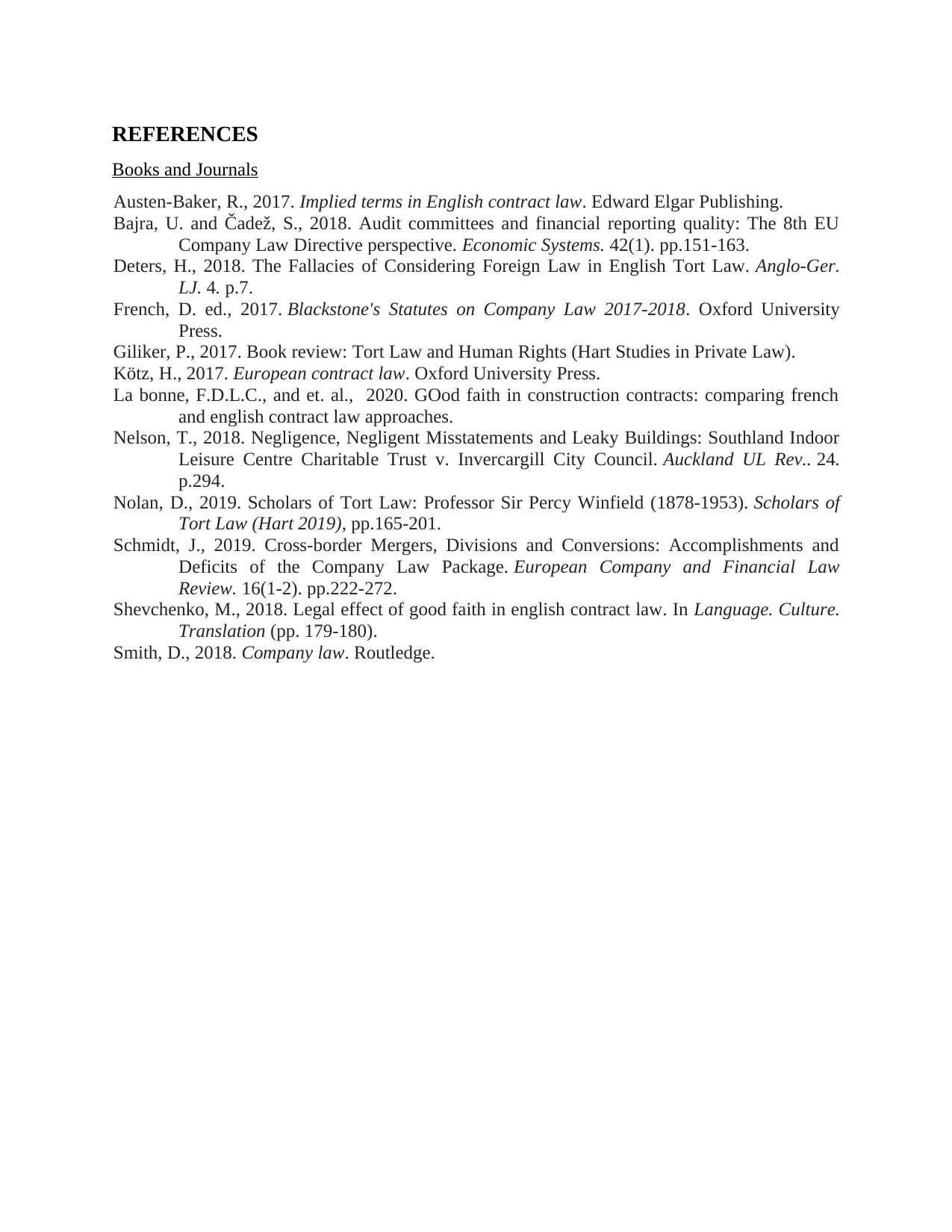
REFERENCES
Books and Journals
Austen-Baker, R., 2017. Implied terms in English contract law. Edward Elgar Publishing.
Bajra, U. and Čadež, S., 2018. Audit committees and financial reporting quality: The 8th EU
Company Law Directive perspective. Economic Systems. 42(1). pp.151-163.
Deters, H., 2018. The Fallacies of Considering Foreign Law in English Tort Law. Anglo-Ger.
LJ. 4. p.7.
French, D. ed., 2017. Blackstone's Statutes on Company Law 2017-2018. Oxford University
Press.
Giliker, P., 2017. Book review: Tort Law and Human Rights (Hart Studies in Private Law).
Kötz, H., 2017. European contract law. Oxford University Press.
La bonne, F.D.L.C., and et. al., 2020. GOod faith in construction contracts: comparing french
and english contract law approaches.
Nelson, T., 2018. Negligence, Negligent Misstatements and Leaky Buildings: Southland Indoor
Leisure Centre Charitable Trust v. Invercargill City Council. Auckland UL Rev.. 24.
p.294.
Nolan, D., 2019. Scholars of Tort Law: Professor Sir Percy Winfield (1878-1953). Scholars of
Tort Law (Hart 2019), pp.165-201.
Schmidt, J., 2019. Cross-border Mergers, Divisions and Conversions: Accomplishments and
Deficits of the Company Law Package. European Company and Financial Law
Review. 16(1-2). pp.222-272.
Shevchenko, M., 2018. Legal effect of good faith in english contract law. In Language. Culture.
Translation (pp. 179-180).
Smith, D., 2018. Company law. Routledge.
Books and Journals
Austen-Baker, R., 2017. Implied terms in English contract law. Edward Elgar Publishing.
Bajra, U. and Čadež, S., 2018. Audit committees and financial reporting quality: The 8th EU
Company Law Directive perspective. Economic Systems. 42(1). pp.151-163.
Deters, H., 2018. The Fallacies of Considering Foreign Law in English Tort Law. Anglo-Ger.
LJ. 4. p.7.
French, D. ed., 2017. Blackstone's Statutes on Company Law 2017-2018. Oxford University
Press.
Giliker, P., 2017. Book review: Tort Law and Human Rights (Hart Studies in Private Law).
Kötz, H., 2017. European contract law. Oxford University Press.
La bonne, F.D.L.C., and et. al., 2020. GOod faith in construction contracts: comparing french
and english contract law approaches.
Nelson, T., 2018. Negligence, Negligent Misstatements and Leaky Buildings: Southland Indoor
Leisure Centre Charitable Trust v. Invercargill City Council. Auckland UL Rev.. 24.
p.294.
Nolan, D., 2019. Scholars of Tort Law: Professor Sir Percy Winfield (1878-1953). Scholars of
Tort Law (Hart 2019), pp.165-201.
Schmidt, J., 2019. Cross-border Mergers, Divisions and Conversions: Accomplishments and
Deficits of the Company Law Package. European Company and Financial Law
Review. 16(1-2). pp.222-272.
Shevchenko, M., 2018. Legal effect of good faith in english contract law. In Language. Culture.
Translation (pp. 179-180).
Smith, D., 2018. Company law. Routledge.
1 out of 10
Related Documents
Your All-in-One AI-Powered Toolkit for Academic Success.
+13062052269
info@desklib.com
Available 24*7 on WhatsApp / Email
![[object Object]](/_next/static/media/star-bottom.7253800d.svg)
Unlock your academic potential
© 2024 | Zucol Services PVT LTD | All rights reserved.





